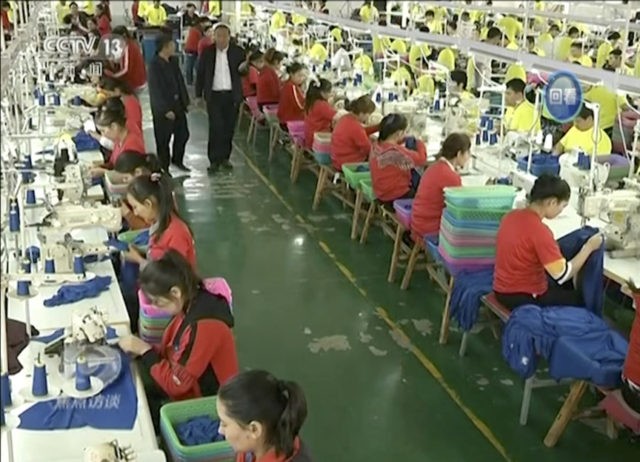The Chinese Foreign Ministry condemned the American company Badger Sportswear for announcing it would no longer purchase clothing from a company based in Xinjiang, where the communist government has built dozens of internment camps to house, enslave, and torture Muslim minorities.
Foreign Ministry spokesman Lu Kang called it “pathetic” that the U.S. company – which claimed it had no knowledge of its purchased shipments coming from Xinjiang before the Associated Press (AP) exposed the origins of the clothing in a report late last year – had chosen not to do business with western China.
China initially denied the existence of the internment camps, which are believed to house mostly ethnic Uighurs, Kazakhs, and Kyrgyz people. It has since branded them “re-education camps” and claimed that they serve to provide job skills to Muslims at risk of being enticed to join jihadist groups.
“If this company has stopped trade exchanges with China based on some wrong information, I think it is pathetic,” Lu told reporters, according to a translation by the state-run Global Times newspaper (the official website of the Foreign Ministry translated this as “a pity” rather than “pathetic”).
“I want to stress that first, China has abolished the reeducation through labor system,” Lu claimed. “Xinjiang’s vocational skills and education training is totally different from the ‘forced labor’ alleged by some parties.”
Lu made the comments while alleging that, “in principle,” China would typically not comment on private business dealings.
The Global Times backed Lu’s claims, asserting that its own “reporting” as a government-owned entity revealed that the government was not guilty of human rights violations in the nation’s largest province.
“During a visit to Xinjiang in late October, the Global Times found that in a satellite factory located in a village of Shorebagh town, the employees all voluntarily chose to work there and get paid,” the newspaper said, citing the salary of one of these factories at around $221 a month.
The Global Times also published commentary on Thursday attacking the United States for leading the efforts against the campaign to erase Uighur culture and Islam generally from Xinjiang. The State Department was among the first entities in the world to reveal the existence of the internment camps and demand China answer for its crimes.
“Western countries and media outlets involved in the concerted anti-China campaign blame the country for what they call social and cultural oppression of Uyghurs in the Xinjiang Uyghur Autonomous Region,” the Times claimed. “But when one sees the human rights record of the U.S., it is not too hard to understand that the main aim of the allegations is not humanistic, but political.
“Washington has put on the mask of humanity for years to discredit countries it doesn’t agree with,” it alleged, claiming that the internment camps were necessary because some Chinese Muslims have reportedly joined jihadist groups in the past. The editorial also attacking media in countries like Turkey – naming the belligerent pro-Turkish government publication Yeni Safak in particular – for reporting on the crimes against Uighurs in China. The Uighurs are an ethnically Turkic people and speak a Turkic language with little in common with Mandarin or other Han languages.
The Chinese government, according to the AP report, is building the factories in question within or in proximity to the “re-education camps,” where for nearly a year Chinese officials have been forcing Chinese Muslims from Xinjiang, which borders Afghanistan, to learn Mandarin, memorize Communist Party propaganda songs, worship Communist Party leader Xi Jinping, and renounce their Islamic faith. Camp survivors have told human rights groups that beatings and electrocutions are not uncommon for prisoners who reject the indoctrination. No survivor has claimed the “vocational” camps have taught them anything other than communist propaganda or that they voluntarily imprisoned themselves there.
The AP added a new detail to the activities within the camps: its December report cited survivors who said they were being forced to manufacture goods for no pay. Clothing is a common item made in the camps. The relatives of prisoners in the camps say that the claim their children needed to learn a skill to have access to the Chinese market does not make sense in the context of who is ending up in the camps – often lawyers, doctors, advertising professionals, and others with stable employment.
Reuters reported last year that it had evidence via satellite imagery of the existence of over 1,000 camps throughout the vast province; previous reports estimated that as many as between 1 and 2 million people, mostly Uighurs but of other ethnic minorities as well, are currently imprisoned in the camps.
The AP found that some of the clothing made in Uighur internment camps found its way to the United States through purchases by Badger Sportswear, which sells clothing to university apparel stores.
On Wednesday, after an internal investigation, Badger Sportswear cut ties to its Chinese supplier Hetian Taida, which sold the U.S. business the Xinjiang clothing, “given the controversy around doing business.”
“Furthermore, we will not ship any product sourced from Hetian Taida currently in our possession,” Badger added in a statement.

COMMENTS
Please let us know if you're having issues with commenting.